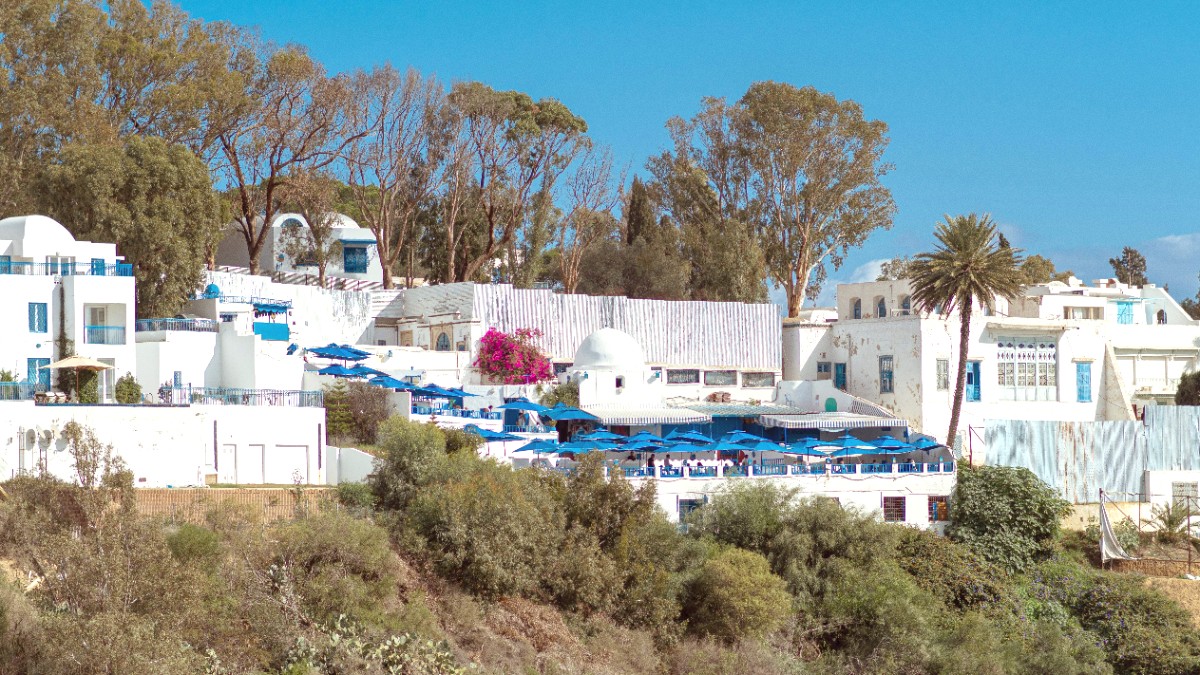
Tunisia
Spring (March-May): Temperatures stay mild, averaging 15-25°C (59-77°F). Humidity levels remain low. You might see moderate rainfall, notably in March. This period features comfortable conditions for sightseeing.
Summer (June-August): This season brings hot and dry weather. Temperatures average 28-35°C (82-95°F) but often climb higher inland. Coastal areas experience higher humidity. Rainfall is minimal. This time of year is popular for beach activities.
Autumn (September-November): September and October remain warm, with averages of 20-30°C (68-86°F). Temperatures cool to 15-20°C (59-68°F) by November. Humidity drops. Occasional rainfall heightens toward late autumn. This shoulder season features good weather for exploration.
Winter (December-February): Temperatures stay mild, averaging 10-17°C (50-63°F). Nights become cooler. This period sees higher precipitation. While cooler, it features a different perspective on the landscape and fewer crowds.
High, shoulder, and low season periods impact your travel experience with varying crowd levels and prices.
Choosing the right time to visit Carthage can make a significant difference in your trip enjoyment, balancing weather conditions with tourist numbers and costs.
June-August
Warmest weather for beach holidays, all tourist services operate fully, perfect sea temperatures, many coastal events.
Attractions crowded, prices for flights and accommodation heighten, heat makes site exploration difficult.
March-May & September-October
Temperatures stay pleasant for sightseeing, fewer crowds, prices stay more moderate, spring features lush landscapes.
Sea might stay cool in early spring, some services may have reduced hours in late autumn, rainfall chances heighten.
November-February
Fewest crowds, lowest prices for accommodation/flights, cooler weather suits archaeological sites, local festivals.
Cooler temperatures arrive, higher chance of rain, some coastal resorts may close, daylight hours shorten.
Spring (April-May) and Autumn (September-October) feature comfortable temperatures. This permits long periods of walking and outdoor viewing. The sun is less intense, and the air stays clear.
July and August feature the warmest sea temperatures. June and September feature warm weather with fewer crowds, permitting a more relaxed beach experience.
Spring (April-May) and Autumn (September-October) for comfortable conditions.
July and August for warmest seas, June and September for fewer crowds.
Autumn to Spring (October-April) to avoid extreme summer heat.
Spring for wildflowers and green scenery, Autumn for pleasant temperatures.
Check local calendars for seasonal festivals and happenings.
Requirements vary by nationality. Preparing your documents before travel removes stress upon arrival.
Citizens of the United States, Canada, most European Union countries, Australia, Japan, South Korea, and many Arab countries do not require a visa for stays up to 90 days. This applies to tourism purposes. A valid passport is sufficient for these travelers.
Citizens of other countries must obtain a visa in advance. Apply from a Tunisian embassy or consulate in your country of residence. Requirements vary by country. They generally include a completed application form, a valid passport, recent passport-sized photos, proof of accommodation, and proof of financial means.
No specific health-related entry requirements or vaccinations are currently mandatory for entry to Tunisia. Travelers should still review recommended vaccinations (see section 2.4).
Tunisia has options for different travel styles, from backpackers to luxury seekers.
Closed currency, no import or export permitted. You must exchange upon arrival.
Use banks, authorized exchange offices, or major hotels. Airports also feature exchange counters.
Convenient cash access in urban areas. Notify your bank of travel plans to prevent card freezes.
Accommodation: 4-5 star hotels or luxury riads (150+ TND per night).
Meals: 100+ TND for upscale experiences.
Private transfers/drivers (50+ TND). Private tours and exclusive experiences (50+ TND).
Travel includes health and safety planning. Tunisia is generally a safe country for tourists, but awareness and preparation remain prudent.
A well-prepared traveler minimizes risks and deals with any unexpected situations effectively, ensuring a smooth journey.
No specific vaccinations are mandatory for entry. Consult a travel health professional for recommendations, including routine, Hepatitis A, and Typhoid shots. Consider Hepatitis B and Rabies for longer stays.
Traveler's diarrhea, sunburn, heatstroke, and insect bites are common. Drink bottled water, use sunscreen, stay hydrated, and apply insect repellent.
Private clinics in major cities provide higher standards. Pharmacies are well-stocked. Emergency numbers: Ambulance 198, Police 197, Fire 190.
Tap water is generally not safe for drinking. Stick to sealed bottled water for drinking and brushing teeth. Avoid ice in drinks unless you confirm it comes from purified water. Choose restaurants that appear clean and have many local customers. This often signals good hygiene. Be cautious with street food, though many stalls are safe and popular. Confirm food is thoroughly cooked and served hot. Wash hands before eating.
Overall, Tunisia has a relatively low crime rate against tourists. Stay aware of your surroundings, especially in crowded areas like souks or public transport. Petty crime (pickpocketing, bag snatching) can occur. Keep valuables secure and out of sight. Use a Money belt. Tourists may encounter scams; politely decline unsolicited offers.
Carthage, as an archaeological site and residential area, is generally safe during the day. Exercise caution in poorly lit or deserted areas at night. Avoid walking alone in the Medina late at night. Natural hazards include rare earthquakes, localized flooding from heavy autumn rains, and extreme summer heatwaves. Plan outdoor activities for cooler hours and stay hydrated.